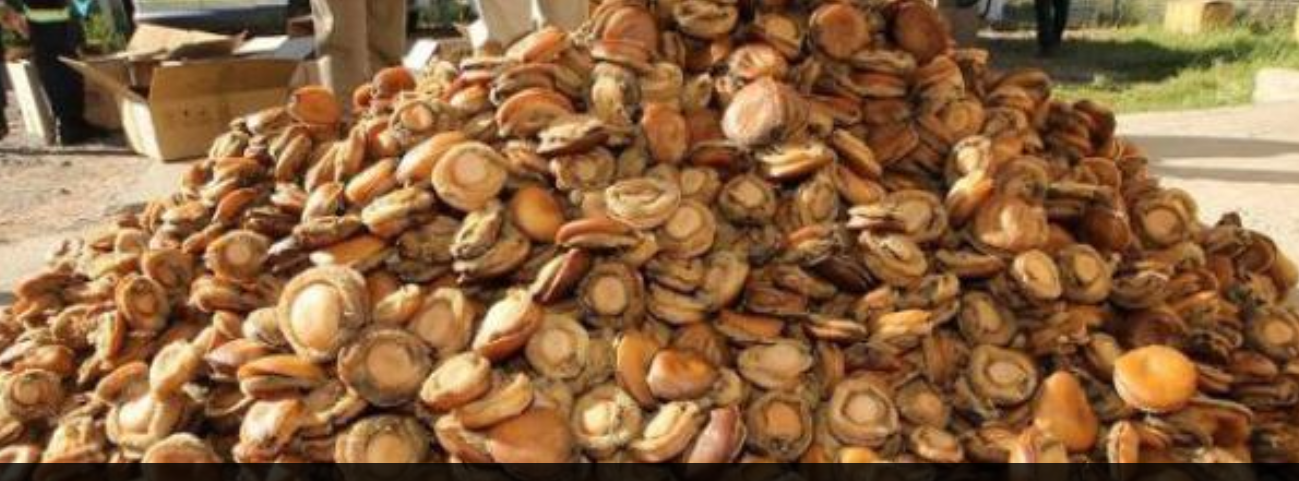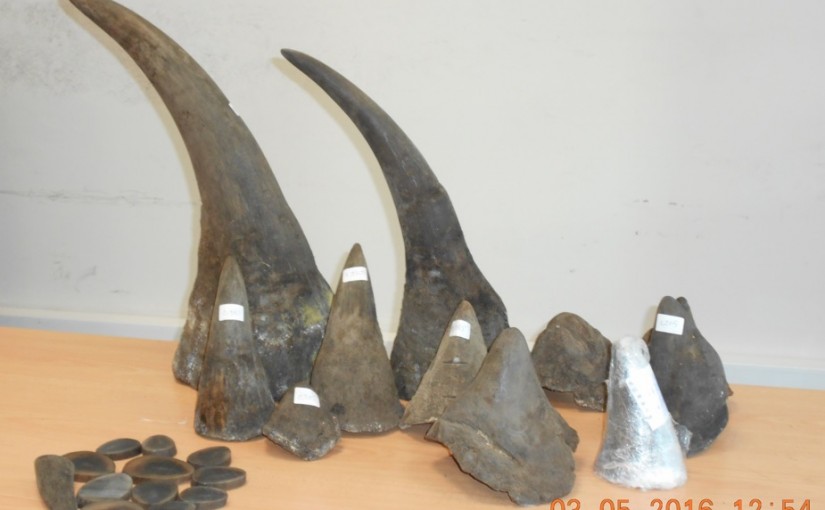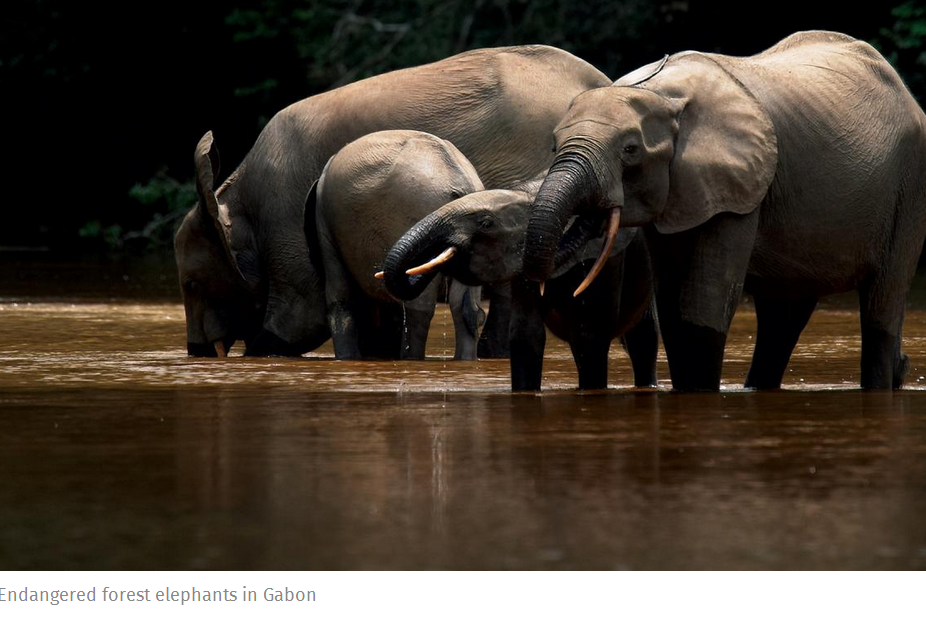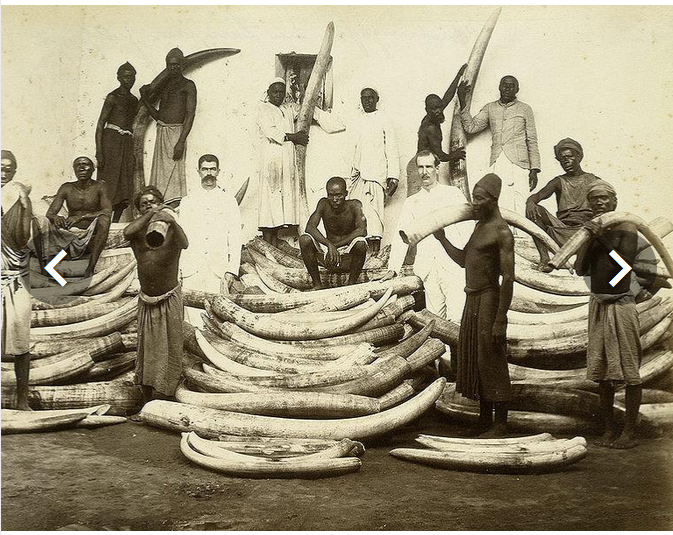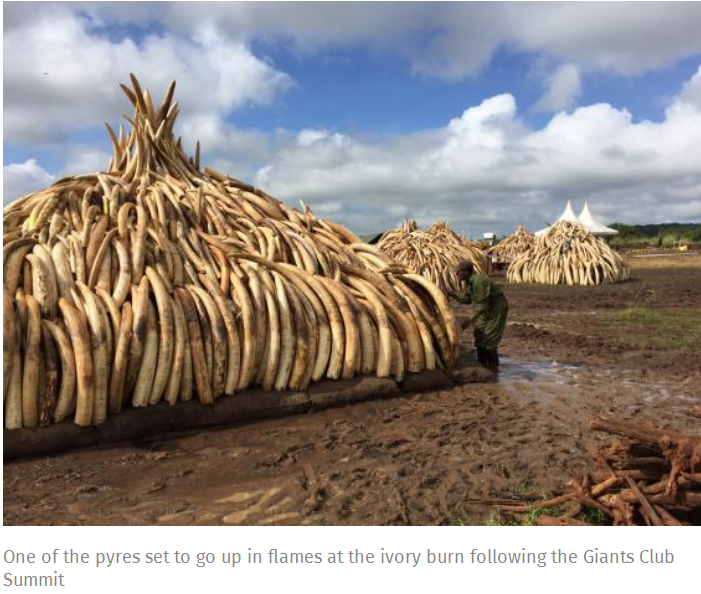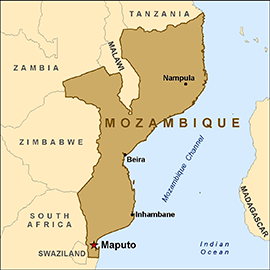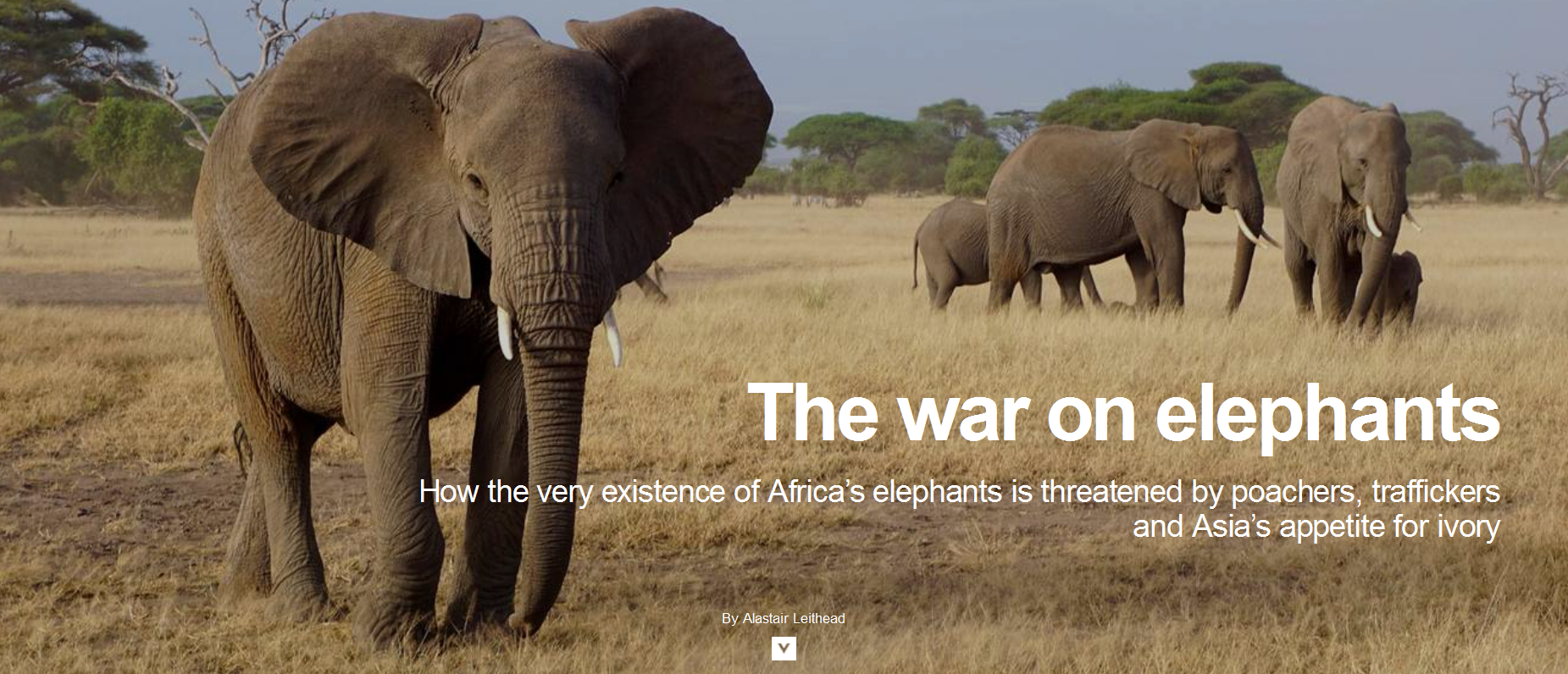
Outgunned
Bloated and eerily upright the large adult
elephant was still standing where it had been killed - just next to
the stream - its face hacked off.
It had been fleeing the carnage in the mud 100m or
so away, where the remains of four other adults and one young
elephant lay fallen and disfigured, their tusks and trunks all taken
for ivory and meat.
Like a macabre statue, this faceless animal stood
as a landmark to the horrors of poaching, of the ivory trade, and of
the mass slaughter of the last remaining elephants in central Africa.

Like a macabre statue, this faceless animal
stood as a landmark to the horrors of poaching, of the ivory trade,
and of the mass slaughter of the last remaining elephants in central
Africa.
The armed rangers on patrol nearby
hadn't heard the shots, so it was the scavengers feasting on the
carcasses that had raised the alarm.
Garamba, in the north-eastern
Democratic Republic of Congo, is one of the oldest national parks in
Africa, designated in 1938.
It covers 14,000 sq km (5,500 sq
miles) dominated by savannah grasses, which when green and lush can
reach 3m in height, enveloping the elephants and concealing them even
from the air.
It's tough going on foot with the
criss-crossing streams that feed the great Congo River, punctuated by
papyrus marsh, forest and scrub.
The park was made a World Heritage
Site in 1980 for its rare Northern White Rhinos, and with 22,000
elephants back then, they never seemed in danger.
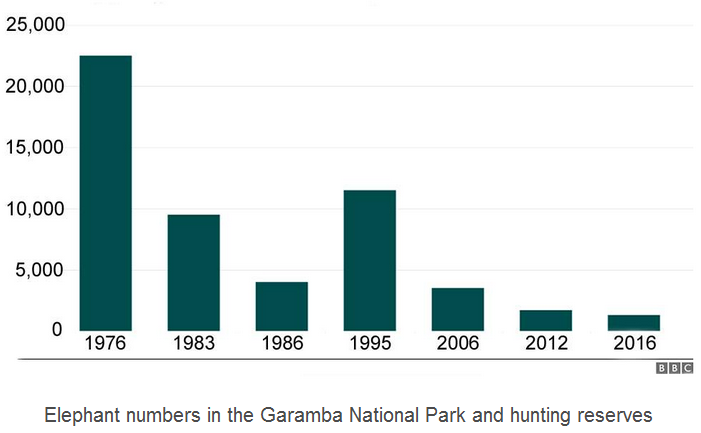
But the last rhino was seen some
years ago. Poaching has wiped them out, and now with 95% of the
elephants gone, and the killing continuing week after week, these
giants are going the same way.
It's not a good neighbourhood for
conservation.
"This
park has, to a very, very large extent been poached out by various
armed groups,” says Erik Mararv, the 30-year-old African-born Swede
who manages Garamba for the non-profit organisation, African Parks.
For many years Joseph Kony's Lord's
Resistance Army has funded its rampage of rape, kidnap and killing
through the ivory trade, but there's a newer, bigger threat.
The park borders South Sudan, the
world's youngest country, which has been tearing itself apart in
civil war for more than two years.
Disparate heavily armed rebel groups
regularly pass through, killing the animals, cutting off their tusks
and handing them over to traffickers, who smuggle the ivory across
the continent and on to its main markets in Asia.
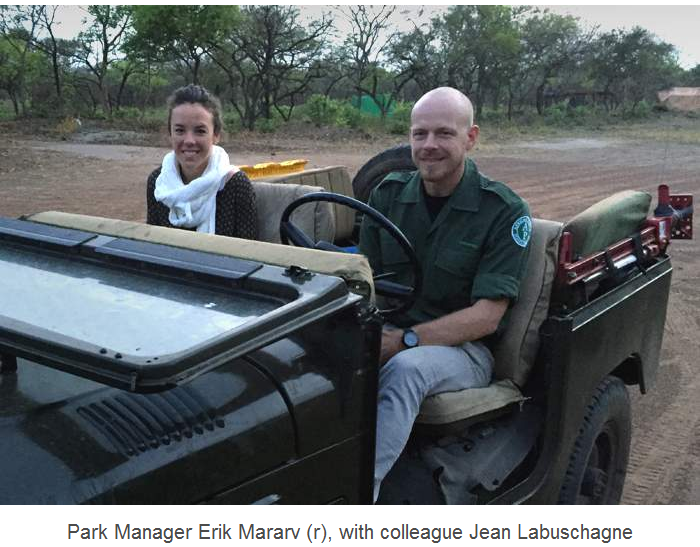
There's also the threat of local
poachers and heavily armed Sudanese horsemen hiding among the nomadic
cattle herders who come south through the Central African Republic.
It's thought that soldiers from there and nearby countries have
joined the killing frenzy.
"I think Garamba is probably,
today, the forefront of conservation in terms of dangers,” says
Erik Mararv, whose armed rangers are often outgunned.
"I just don't think there are many
other places which have so many contacts and so many threats to one
park as we do here, so it's really on the edge.”
Erik has fewer than 100 rangers,
supported by an equal number of DRC soldiers allocated to the park,
but says he needs three times that number.
"Today's poaching incident shows
you it's just a question of the number of boots on the ground,” he
says.
The number of people we have is just
not enough to support and protect all these elephants.”
Just three weeks earlier, five
elephants had been killed - one of them a baby.
Again they were spotted from the air.
The anti-poaching units set off in pursuit, but the poachers were
long gone with their haul.
At first light each morning the park
rangers run through their training drills, tackling the assault
course or heaving truck tyres around, before moving to the shooting
range.
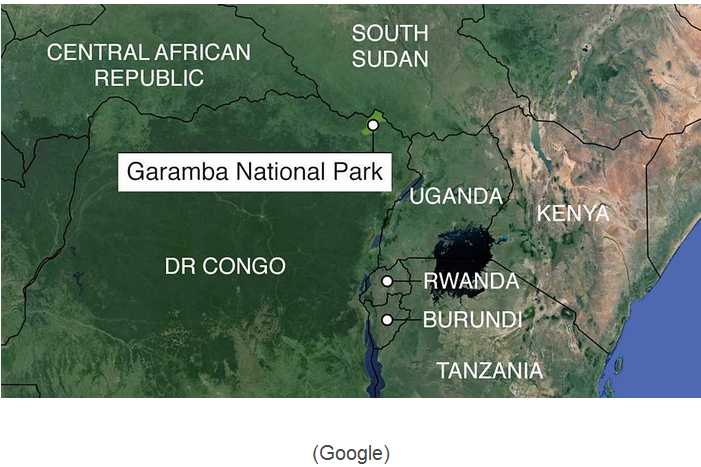
Ancient AK-47s and old ammunition
hamper their efforts to fire their five allocated training bullets
through the cardboard targets, even though they're just 50m away. The
rifles jam, perhaps only half hit the mark.
And then the rangers are off into the
bush for nine-day patrols, sleeping within earshot of lions, but far
more at risk from other human beings.
Three times last year rangers were
shot dead. On one occasion poachers stumbled over their camp at dawn
and opened fire. On another they were ambushed and three were killed.
And there was a mission beyond the
park borders that ended in chaos. A 10-man patrol followed the
satellite trail of an elephant tracking-collar the poachers had
inadvertently taken along with the tusks, and found themselves under
an intense attack.
"It was a very difficult situation.
They had very good guns, grenades and rocket-propelled grenades,”
says Brigadier Chrysostome Agare-Adroaba, 38, who lost four of his
colleagues when 40 Sudanese horsemen opened fire on the patrol.
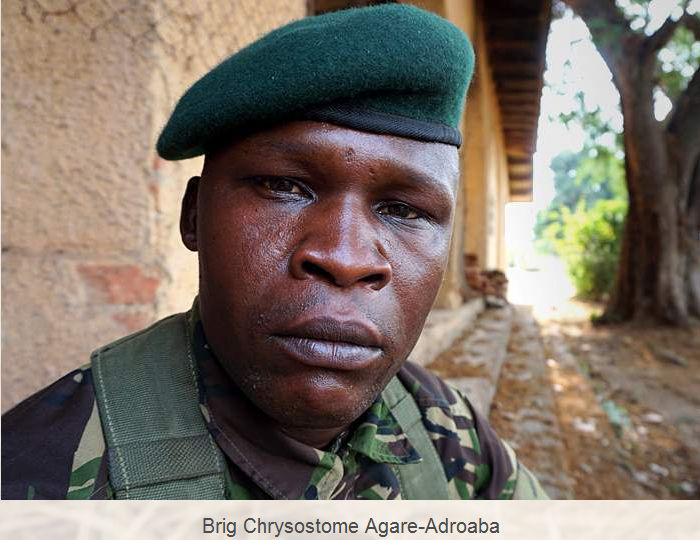
Flying into the gun battle to rescue
the rangers, the park's helicopter took a number of hits.
"It's not a nice feeling. It sounds
like hail on a roof - the rounds coming past,” says pilot Frank
Molteno, who was lucky to survive, and only just succeeded in getting
the badly damaged helicopter back to base.
"That situation was a hot
extraction - I didn't really have a choice - the guys were under
extreme duress.”
Here in Garamba it seems more like
war than conservation.
The South African ex-military
advisers brought in to train rangers say an even more militarised
approach - proactively going out and hunting the hunters - is the
only way to save the last 1,300 or so elephants in Garamba.
But the European Union pays a big
chunk of the park's bills, and the rangers cannot use European money
to create an army that shoots first and asks questions later.
The government of the DRC also
doesn't want a foreign organisation coming in, training a militia and
providing it with new weapons, in a place where there are already too
many armed groups.
"When I started here there was a
lot of rhino, elephant, giraffe and antelope,” says Mamyte Tandubha
Salomon, who's worked as a park ranger for 20 years.
You could walk in the park and every
time would see something, but now you have to search in the bush to
find just one giraffe or one elephant.”
Nonetheless, Erik Mararv is convinced
that if security can be improved, Garamba will become sustainable in
a decade or so by attracting a special type of adventurous, high-end
tourist.
And he believes the stakes are much
higher than just maintaining a national park.
"It's worth so much more than just
the animals. It's about trying to stabilise a whole region which has
been unstable for decades.
"It's about trying to basically
build peace. And that is why we wake up every morning, why everyone
fights this war, and why we try and save the elephants. It's about
basically saving Congo.”
On 23 April 2016, three rangers were
killed in a fresh clash with poachers. Park manager Erik Mararv and
another ranger were badly injured.
"We are devastated by this latest
loss,” said Peter Fearnhead, CEO of African Parks. "Rangers put
their lives on the line each and every day, and are under real siege
in Garamba, protecting elephants from heavily incentivised and
militarised poaching gangs, who threaten the very survival of humans
and wildlife alike.”
Men with poison arrows
There is a quiet satisfaction in the
poacher's voice as he describes killing an elephant with a poison
arrow.
"We choose an elephant by looking
at the size and killing the biggest one,” says Alex, one of three
poachers who has agreed to talk on condition of anonymity.
They prefer arrows to guns as they
are cheaper, easier to obtain, and quieter, and the man in the
middle - who calls himself Master - says the poison, made from a
local herb, is highly effective.
Once you shoot the animal it takes
just 15 or 20 minutes. So you just track the animal and it
collapses.”
Their attitude toward killing
elephants is surprisingly matter-of-fact.
"I don't regret it,” Master
says. "I feel heroic, because they terrorise us, they invade our
farms. And we don't get any compensation, so you end up with no food
and no money.”
From his perspective there is more
value in a dead elephant than in a living one that tourists might
pay to see.
"We never know how much money is
made from the animals in the parks. There is never any
accountability,” he says.
Alan is the quietest of the three.
He says that a lack of work, and of money, led him to kill an
elephant but that the experience left him feeling remorseful and
anxious.
"Because if I kill the animal I am
aware I will be in danger and my family will be in problems if I am
caught or shot,” he says.
Master has been doing this for six
years, and he describes how they take off the tusks and prepare them
for sale.
"Once you remove them, there is
some meat on them, and they are heavy, so we have to make sure they
are clean so they are light to carry,” he says.
We use battery acid to erode the
meat or if there is no acid we bury them and the meat rots away.”
Master is a hunter but also a
low-level broker, and he explains the process of hiding the ivory in
the bush, finding a buyer, negotiating a price and then providing
directions to his customer. Being caught in possession of ivory is
where the risk lies.
He had at least one tusk for sale,
but I wasn't allowed to see it. He took video footage and
photographs of it resting on a daily newspaper as proof it was
genuine.
"We don't sell directly to the
Chinese, but we go through local brokers who rip us off. We get
maybe 5,000 Kenyan shillings ($50, or £34) per kilogram but they
sell it for a lot more. It is not a high-paying job. The people who
make the most money are the middlemen.”
And according to Master, corrupt
officials allow the whole process to continue.
"They collude with us, we collude
with them and once we sell the tusks we give them money,” he says.
"Bribery and corruption make it easier, because the salaries they
are being paid are not enough.”
Every year in Africa between 30,000
and 40,000 elephants are poached for their ivory, and it's thought
there are only 400,000 left.
Even accounting for the newborns,
this rate of killing calls into question whether these amazing
creatures will still be around in a generation, especially as
Africa's ever-increasing population is reducing the space for them.
Master, Alex and Alan are at the
bottom of the chain - the ones responsible for the killing and the
destruction - but like illegal drugs, if there wasn't a market they
wouldn't be paid, and neither would those at every stage along the
trafficking route to Asia.
Organised crime runs the ivory
industry.
"Corruption is probably the single
biggest cause of the increase in elephant poaching,” says Esmond
Bradley Martin, who has spent decades talking to traders and
traffickers and investigating smuggling routes around the world.
"Most ivory now is going out of
Africa through Dar es Salaam and Mombasa, so there's corruption in
those ports as well. Then it has to be shipped over to Asia - mostly
Vietnam and China - so there's corruption all along the line. And
it's obviously increased significantly.”
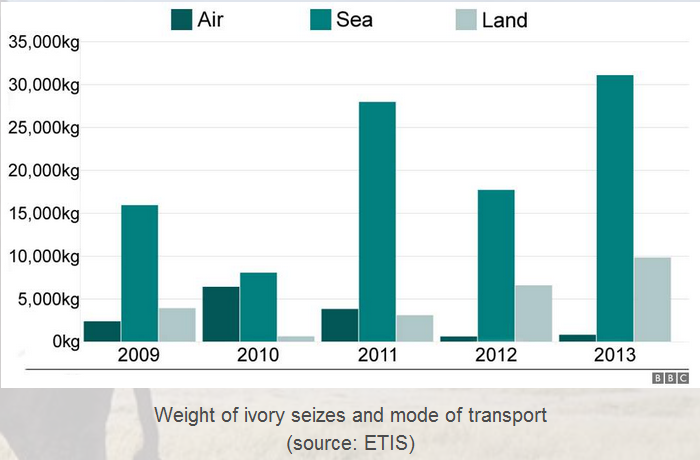
Many of the complex networks crossing the continent lead to the Kenyan port of Mombasa, which for the past few years has been the hub of African ivory smuggling.
Peter, as he asks to be known, works for a shipping company at the port, doing the "clearing” - receiving containers for export and ensuring their documents are all in order.
Exporting ivory is illegal, but he admits turning a blind eye and helping to smuggle tusks out of the country.
Most of the ivory leaving Kenya originates somewhere else, so a bribe has to be paid to customs officials at the borders on the way in.
"They camouflage it by saying it's sugar, tea leaves, or any other goods that we import into the country,” he says, nervous to talk to the BBC because of a recent crackdown in Mombasa.
Peter becomes involved when the sealed container arrives at a warehouse at the port to await shipment to another country.
"Someone comes and tells you, 'We have goods, this is a special consignment, it has to pass through without being checked,'” he explains.
"So we talk to the guys at the port, and they let it go through.”
But it's a costly exercise.
"Ten thousand dollars (£6,900) is the minimum, because it's not just one person who gets the money. There are different levels: security guys, officials, even guys in my company who have to be given something.
But you never know who's behind it. If it's not the Somalis, it's the Arabs or the Chinese. It's a cartel, they're very smart intelligent people, and they're well connected.”
The last big haul uncovered in Mombasa was in 2013, and Peter says that happened only because security officials weren't bribed enough.
He then describes a big shipment which left at the end of last year heading to Hong Kong.
"It was passing through Dubai port. I don't actually know how much the ivory was worth - but it was a 40-foot container, and it got through,” he said.
The ivory is getting through because people are prepared to pay for it. Stopping the men with arrows and the corrupt officials is just one part of the solution - the other is destroying the hunger for ivory.
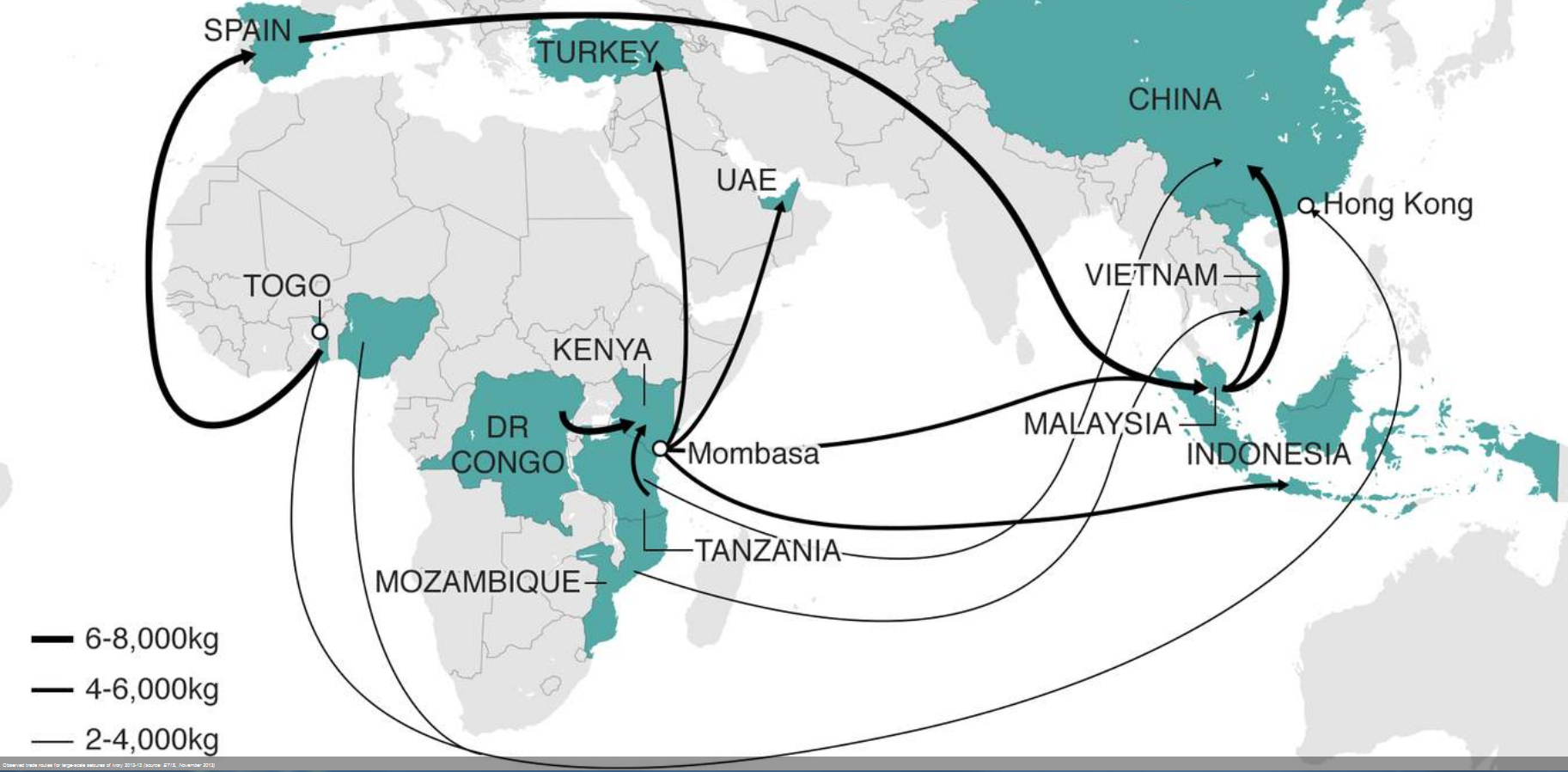
All routes lead to Asia
The love of ivory goes back millennia. Its pure, translucent beauty and the ease with which a tusk can be carved into intricate sculptures, has given it a lasting value throughout the ages.
A small ivory statue discovered in the Great Pyramid at Giza is the only likeness of a pharaoh who died more than 4,500 years ago.
"You find ivory artefacts in graves that are tens of thousands, hundreds of thousands, of years old,” says Tom Milliken, elephant and rhino expert for the wildlife trade monitoring network, Traffic.

Sometimes it's elephant ivory, sometimes the ivory of an animal now extinct, the mammoth.
Milliken, who has followed the illegal trade in ivory for 30 years, has a theory.
Elephants seem to always get hammered in modern history every time you have a rapid expansion of the middle class.”
"Looking at Victorian England this was the time that colonial Britain imported more ivory than any country in the world, but it's also the time when you had the greatest expansion of the middle class in the UK.
"The 1970s and 80s was a tragic time for elephants and probably half the population was exterminated for ivory trade to Asia, linked very strongly with the economic growth of places like Japan.
"Now it's equally devastating, but there are fewer elephants. So again we are in crisis and this time it is being driven by economic development in China.”
From Victorian billiard balls and cutlery handles, through Japanese chopsticks and name seals, to Chinese bangles and mah-jong sets, this latest crisis is perhaps the most serious, he argues.
"China is just a bigger scale,” he says.
And there is another important change, he points out.
"We not only have to address the demand in China, but we also have to address Chinese criminal networks that have penetrated the supply chains here in Africa.
"And that's a fundamental difference.”
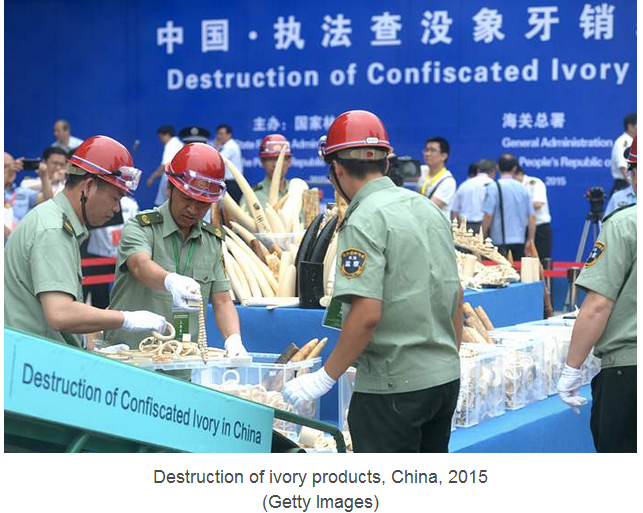
A high-profile publicity campaign driven by social media has been launched in China to try to destroy the demand for ivory by educating people about the impact it has on the African elephant population.
Some big names, such as film star Li Bingbing - with more than 40 million followers on microblogging site Weibo - are among those trying to persuade millennials to boycott ivory products.
Tom Milliken is confident it is possible to persuade Chinese consumers to change their behaviour, because it has been done before - in Japan. But he also wants the Chinese authorities to do more.
"China has to come to Africa and station their own law enforcement investigators to collaborate and work directly with Africans,” he says, welcoming some recent convictions of ivory traffickers in China.
"Every time high-profile Chinese nationals are arrested in the context of a wildlife crime case these investigators could do the interrogation so there is no language problem. They can help the governments put together the cases and try them here.”
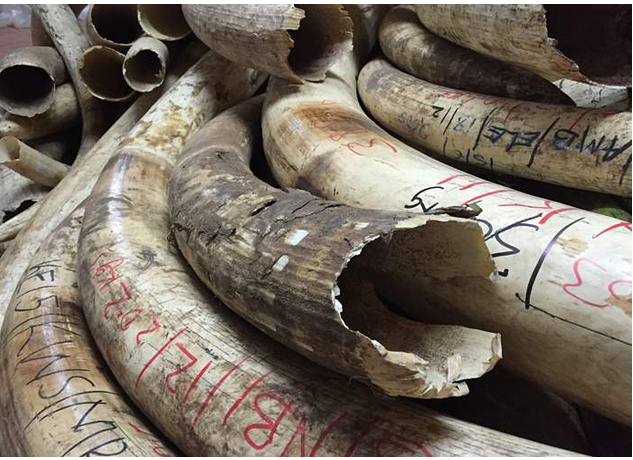
In a basement strong-room at the Kenya Wildlife Service (KWS) headquarters in Nairobi the mountains of tusks reaching from the floor to the ceiling attest to the successes the Kenyan government has had in stopping the illegal ivory trade.
Each individual tusk has been registered and labelled. Accompanied by a team of armed rangers, they are being carried off to be destroyed at the biggest single ivory burn in history.
KWS director general Kitili Mbathi has invited journalists and photographers along to record what's essentially a very expensive public relations exercise. If the ivory was to be sold it would make a fortune for the Kenyan treasury.
"The reason is to essentially make a statement to the world that number one, we are committed to conservation - and to underline the fact that we don't believe that there ought to be any value attributed to ivory and rhino horn, except on elephants and rhinos,” he says.
Later this year at a Convention on International Trade in Endangered
Species (CITES) meeting in Johannesburg, the world's wildlife experts will come together, and one of the key questions up for discussion will be whether today's limited international legal trade in ivory should be banned outright.
Broadly speaking, southern African countries, where many of Africa's 400,000 elephants remain, are in favour of selling ivory stockpiles and using the money for conservation. There have been two one-off sales in 1999 and 2008 from southern African countries to China and Japan.
But countries such as Kenya are vehemently opposed to any ivory sales - saying they just encourage the illegal trade - and want a complete ban.
It is a fierce debate within the conservation world. Some argue that because ivory is now being hoarded as a commodity by investors, destroying huge amounts will increase its rarity value and actually put the price up.
"Ivory stock destructions, potentially - and an economist will tell you this in terms of economic theory - increase ivory prices,” says Tom Milliken.
"And if you increase ivory prices you increase the profitability for the criminals, and it actually turns out to be counter-productive.”
He says this has actually happened in China, the price of ivory rising after tonnes of it were publicly destroyed. Locking ivory up and throwing away the key is a good middle ground, he argues, because it keeps the ivory off the market, without increasing its rarity value to speculators.
But you've got to find the illegal ivory first.
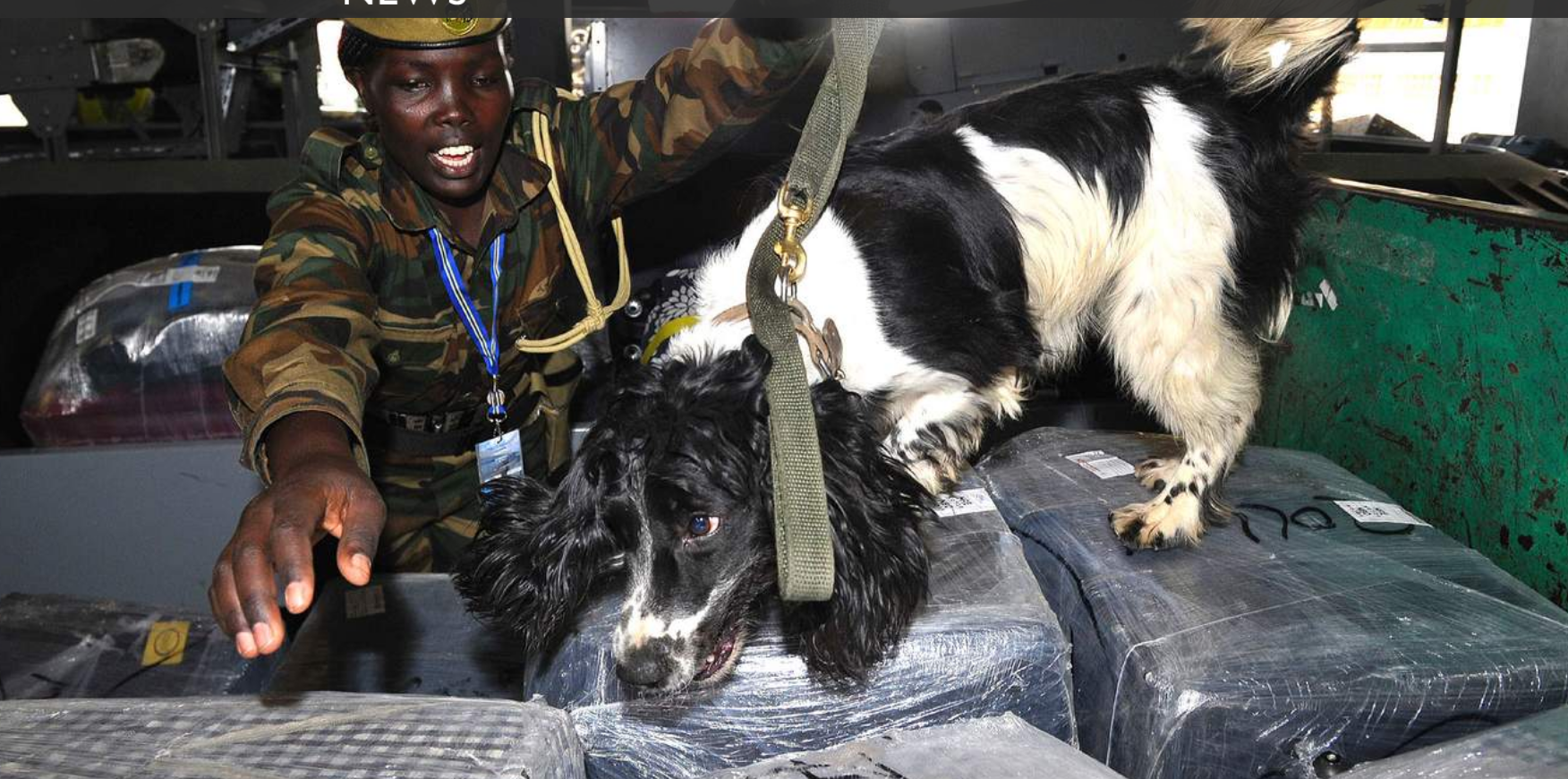
Asha is an over-zealous Springer spaniel frantically bounding from suitcase to suitcase on a baggage-belt treadmill, behind the scenes at Jomo Kenyatta International Airport in Nairobi.
She's an ivory dog, specially trained to sniff out illegal wildlife goods hidden in suitcases. When she finds something, she sits, and her trainers suddenly know where to look.
Every shift ends in a discovery and a treat, even if they have to plant it there to keep her interested.
The dogs are used to checking specific routes.
"Those flights going to China, Vietnam and such areas, are the flights we target to make sure there's no smuggling to those countries,” says KWS ranger Jonathan Musani.
Most of the finds are small trinkets and bangles, but the dogs did recently discover more than 64kg (141lb) of ivory at the airport's cargo terminal, after a tip-off.
Most of the time those arrested are small-time smugglers. But some suspected high-level traffickers have been arrested in Kenya and in Tanzania, which has lost an astonishing two-thirds of its elephants in the past five years.
Yang Feng Glan, whom the media has dubbed the "Ivory Queen”, is on trial in Dar es Salaam at the moment, charged with trading tusks and leading an organised crime ring.
She denies the charges. And cases against suspected kingpins are being built in Kenya, which has introduced a special Wildlife Prosecution Unit, as well as toughening up its penalties for trafficking tusks.
Tackling demand and destroying the market are both important.
But there are also ways of making elephants more valuable alive than dead.
Making hunters pay
In the parks and game reserves of Africa, close encounters with the most remarkable animals on the planet lie in wait - you just need time, patience and a good eye.
A stretch of water in south-west Africa known as "the horseshoe” - in Namibia's Bwabwata National Park - is the place to find elephants when the rainy season scatters them far and wide.
When it's wet, they don't need to make the daily trek to a water hole to drink, but this place is a favourite place for a bath, even if bathtime is unpredictable.
After five days visiting the horseshoe to catch a glimpse of an elephant or two, and then hours of staring into the surrounding forest imagining trunks in every tree, a distant trumpeting marked the beginning of the most incredible hour of wildlife watching.
Perhaps 200 elephants bounded out of the trees, down the dirt slope and into the water. The smallest calves had to use their trunks as snorkels when they ventured a little too far.
There was joyful trumpeting, and games of chase and splash, as these huge beasts surged into the water, oblivious to the presence of a BBC camera crew, who sat enthralled by a magical and memorable experience.
As fast as they had arrived, they were gone, leaving just ripples in the water and footprints in the sand.
Here in Namibia a counter-intuitive approach to conservation is increasing their numbers - hunting.
Few tourists travel to the narrow corridor of land known as the Caprivi Strip, a colonial hangover that gave what was once German West Africa access to the great Zambezi River.
Recent separatist struggles have kept the Zambezi Region off the safari trail.
And while adventurous travellers are now discovering its role as the route the animals take into Botswana's beautiful Okavango Delta, they don't bring in enough money for conservation.
But it's got to come from somewhere.
"Buffalo! Buffalo!” shouts Brutus Musutela, from his vantage point standing on the back of a 4x4. This local community ranger's keen eye for wildlife has been honed by years of illegal hunting - he now laughs about his transformation from poacher to gamekeeper.
Hundreds of buffalo head towards the parked vehicle, and watching through their binoculars the hunting party begin to discuss which beast they will try to kill.
For his 50th birthday, Andreas Ullrich wanted to shoot a buffalo, and so the German national, now living in Namibia, has come here to do it.
Hunting is banned in Namibia's national parks, but the land between them has been parcelled up into separate "conservancies” as they are called - areas where the wildlife is managed by the local communities, quotas are set and hunters are invited in.
David Muller, the local professional hunter, is allocated a quota of antelopes and other animals - among them buffaloes and elephants - to be shot in any given year.
"People who are so dead-set against hunting don't have all the facts about what it's all about,” he says.
His job is to attract hunters to the conservancy who are prepared to pay big money for a "trophy” - the animal's head which is taken home and mounted on a wall.
The cost differs, but a poor community in this remote part of Namibia can receive well over $10,000 (£6,900) for an elephant.
Trophy hunting is supposedly to take out the older animals that are going to die in two or three years anyway.”
"Why let it die of old age if it can raise some money for the community?” says Muller.
"Wild animals like buffalo or elephant are like cattle - you can't run a farm and just keep on breeding cattle because you are going to have too much eventually and nothing is going to survive because there's not going to be enough grazing.”
The meat from the animal is shared out in the community and the money raised employs rangers and pays for local development.
In Bamunu conservancy it's been used to buy a communal tractor and four transformers. The power lines being put up will soon bring electricity to its four villages.
"If hunting stops, all the money we are getting will also stop and people will suffer. They will not take their children to school and poaching will increase,” says conservancy chairman Chunga Chunga.
"If poaching is high these animals will be finished and our children will not be able to see these animals - they will just hear that such animals were here.”
Jobs are at risk as well.
When not out on a hunt, Brutus Musutela leads the small band of community rangers who go out on patrol in their conservancy every day carrying precious yellow books.
The books are used to record any rare and significant animals they see, any carcasses they come across and any cases of wildlife damaging crops or hurting people.
Their data is collated and used to set the hunting quotas. If they know how many animals there are, they know how many they can afford to lose.
Accountability is key - the yellow books are made available for all, and if the money doesn't reach the people everyone knows. This simply wouldn't work in more corrupt systems and countries where the money would be creamed off and the community wouldn't feel the direct benefit.
And they are protecting the animals by employing people who might otherwise be poachers.
Hunting often provokes a strong reaction, as demonstrated by the furious response to the shooting of Cecil the lion by an American dentist in Zimbabwe last year.
But the roots of the early conservation movement in Africa lie firmly in the hands of the big game hunters who wanted areas of land set aside for the animals so they could hunt them, not protect them.
"I understand people are getting emotional - Westerners are getting emotional, but here in Namibia it is working,” says Bright Sanzila, the local warden for the Ministry of Environment and Tourism.
"But there is no way you can manage poaching if you are putting the community aside.
"All the money that is coming from hunting is ploughed back to the community - 100% - the government of Namibia does not take a cent from that money.”
One of the few countries allowed to carry out a legal sale of ivory in 1999 and 2008, Namibia has been using the proceeds to pay farmers whose crops have been damaged by wildlife. It's a very different approach from Kenya's, where the funds are raised through tourism.
"Tourism works in a number of places, but elephants exist beyond scenic landscapes,” says Traffic's Tom Milliken.
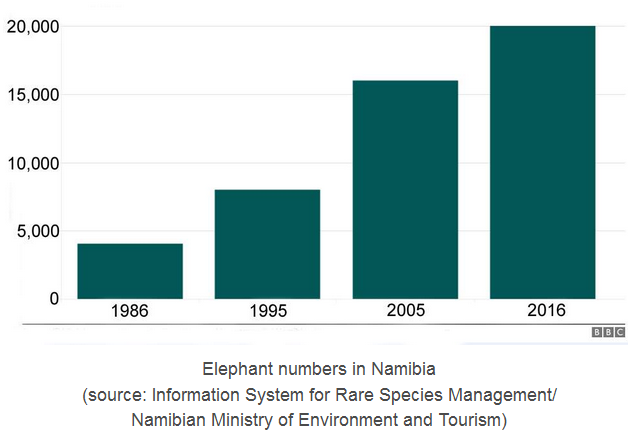
It's a very emotive issue and people have very strong moral objections to a human being killing an animal, but from an economic point of view sport hunting has played a major role in extending wildlife habitats all over Africa.”
Although confronted by a herd of buffalo, on this occasion Andreas Ullrich did not get his 50th birthday present.
The animals the hunting party saw were outside the boundary of the conservancy and inside the national park - they were out of bounds.
Hunters, as well as wildlife watchers, need patience.
Living with elephants
In a small village on the edge of a national park in Kenya a family is grieving for a 10-year-old child, Tippape.
He was tending to the cattle in view of the house one Saturday morning when he was attacked by an elephant and crushed to death.
The whole Masai village grabbed their spears and a gang of 200 headed off into the bush in pursuit.
At least two adult elephants were killed and others badly injured - a calf was orphaned as its mother was one of the dead.
The community is well aware of the benefits the elephants bring, from the tourist visits to the conservation grants for leasing their land.
But when the cost of living alongside elephants is the life of a child, or acres of crops crushed underfoot, difficult decisions have to be made.
There is a stark difference between the way Westerners view elephants, through the prism of safari holidays and wildlife documentaries, and the perception of those who have to live with them.
And in future more people will be living with them.
he number of Africans will double from one billion to two billion people in the next 20 years and there must be somewhere for them to live, somewhere for their food to be grown and for their cattle to graze.
Europe wiped out its vast forests and its big wildlife centuries ago, and there is hypocrisy in asking Africa to protect its landscape at the expense of economic growth.
"If we are going to demand that Africa keeps certain places pristine for animals,” says Tom Milliken of Traffic, "either the world is going to have to pay for it, or the resources that are there - the living animals - are going to have to pay for it in some way.”
There is another problem too, both for humans and elephants - loss of habitat as a result of climate change. As it intensifies the competition for space will only increase.
A hundred years ago there were perhaps 10 million elephants in Africa. Today there are fewer than half a million and that number is falling fast.
They won't become extinct in our lifetimes, but their presence on the planet could be dramatically reduced.
"The worst-case scenario will be maybe 100,000 elephants in highly protected areas throughout Africa surrounded by fences and people on the ground patrolling, making sure no poachers are coming in,” says wildlife analyst Esmond Bradley Martin.
"It is up to the governments to decide how much land they are going to allocate for elephants.”
About half of Africa's remaining elephants roam the sparsely populated spaces of the Kavango Zambezi Transfrontier Conservation Area - a cross-border region the size of France shared between Angola, Botswana, Namibia, Zambia and Zimbabwe.
A new elephant census to be published this year is expected to show a healthy population here, and in some places there are too many elephants for the habitat.
But in most places - as in Garamba and Tanzania - elephants are in decline.
Zimbabwe, for example, is starting to suffer, as cyanide taken from mines is being deliberately put in waterholes to kill elephants for their tusks - wiping out many other animals at the same time.
In some countries though, ways have been found to make live elephants worth more than dead ones.
Garamba's militarised ranger force is funded by benefactors, as tourists don't come to relax in a place surrounded by war. But African Parks, which runs Garamba, has made huge progress at one of its other parks in Chad.
"The bringer of peace to the region has been the elephants,” says Garamba park manager Erik Mararv, referring to Chad.
"The rangers have been a huge asset for peace in the whole vicinity
around the park,” he says, providing jobs, but also improving security in place hit hard by lawlessness and violence.
"People have seen that the elephants have much more value as a peace-bringer than [the] commercial value of [their] tusks.”
Tourism and tougher laws and penalties are working together in Kenya, where the level of poaching in the past five years spiked and then dropped significantly.
In Namibia it's hunting that has given value to live elephants, and a high level of accountability ensures the cash goes where it should.
Solutions in one country do not necessarily work in another, when levels of corruption differ and attitudes towards wildlife change.
"We need a whole variety of tools in our box if we are going to win,” says Tom Miliken.
Reducing the demand for ivory and tackling the traffickers are key among these tools. Without success on these fronts, the poachers will simply move to countries where it's possible to obtain tusks without being caught.
This may be why Botswana is taking such a hard line against poachers, with what is assumed to be a shoot-to-kill policy.
Read More: http://www.bbc.co.uk/news/resources/idt-6d40b788-af2f-4646-8177-c8db7ce6a881
"The whole global community has to come together to make a future for elephants,” says Milliken.
"I think if you lose elephants you are saying something about the future of humanity.
"If we can't learn to live sustainably on Earth, if we can't learn to share space with other creatures, what future is there for us in the long term?”





